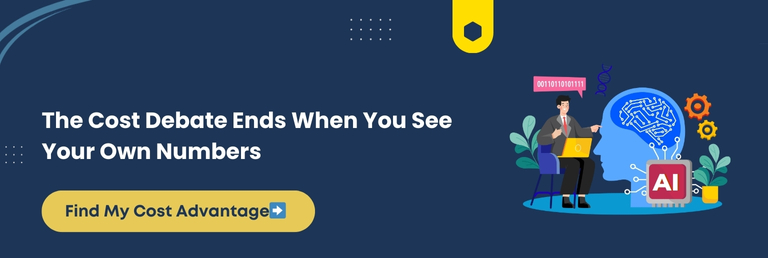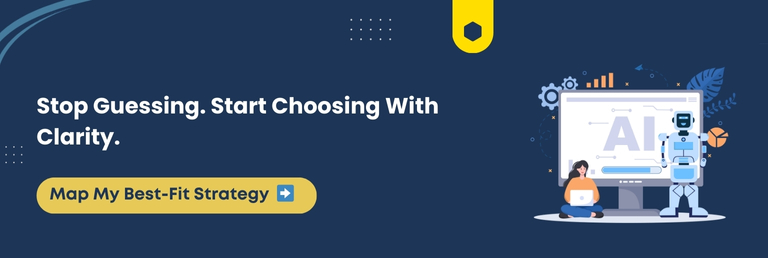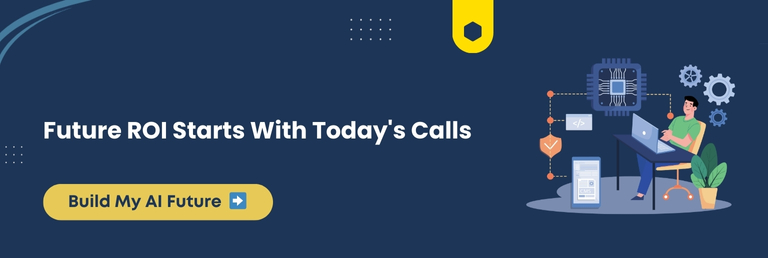Automated Lead Qualification By Phone: AI vs. Human Reps
Keyur Patel
September 17, 2025
22 min
Imagine losing half of your potential customers merely because no one answered the phone fast enough. It is a critical concern many businesses face in 2025, where competition is relentless and patience is almost nil.
Phone-based lead qualification remains the lifeline for companies across healthcare, finance, real estate, and SaaS industry verticals. Every missed or poorly handled call equals lost revenue.
This is where automated lead qualification reshapes the game. Businesses are increasingly turning to sales call automation and AI-powered systems that operate 24/7, never feel drained, never overlook context, and can simultaneously engage thousands of leads.
Hence, the debate between AI and human lead qualification is no longer theoretical; it is financial. Companies worldwide are discovering that the perfect blend of automation and human intelligence can save millions annually while strengthening customer trust.
That is why we created this guide for founders, sales leaders, developers, and tech enthusiasts. Here you will uncover the differences, benefits, costs, and future of AI and human sales representatives. These insights will help you determine where automation should stop and where human connection must take over.
Let us dive in and explore how businesses can embrace a technology-driven approach that not only reduces costs but also sets them apart from competitors.
What Is Automated Lead Qualification By Phone?
Automated lead qualification by phone refers to using artificial intelligence, voice bots, and sales call automation tools to screen and categorize potential customers before they ever speak with a human sales representative.
The system evaluates leads against predefined criteria such as budget, authority, need, and timeline to determine whether they are worth pursuing further.
Unlike manual qualification, where a human rep spends valuable time asking repetitive questions, an AI phone bot can complete the same task in seconds. It accurately captures data directly into CRM platforms. It creates consistency, reduces errors, and ensures that sales teams focus only on high-quality prospects.
Key differences between AI and human qualification approaches:
- Human sales reps bring empathy, creativity, and the ability to adapt during complex conversations. However, they are confined by fatigue, cost, and the number of calls they can handle.
- AI-driven qualification offers scalability, 24/7 availability, multilingual support, and seamless CRM integration. Though it may lack the subtlety required in nuanced negotiations, it can help you obtain vetted leads.
In today’s sales pipelines, AI does not replace human sales teams; it complements them. By automating the first stage of qualification, businesses save time and money while ensuring that reps engage only when human intelligence genuinely adds value.
Main Message: Automated lead qualification by phone streamlines the sales funnel, efficiently filtering high-quality leads and freeing human reps to focus on meaningful interactions that drive conversions.
Human Sales Reps: The Traditional Approach
Phone-based lead qualification has been synonymous with human sales representatives for decades.
These professionals act as the initial point of contact, shaping the buyer’s impression of the company and determining whether a prospect is worth pursuing. Their ability to listen, empathize, and foster relationships gives them a competitive edge in scenarios where emotional intelligence is vital.
Let’s break down both their strengths and limitations to comprehend their role.
Strengths of Human Sales Reps
- Personalization: Humans can adjust tone, phrasing, and style to suit different personalities, making each interaction unique.
- Objection Handling: Reps can think decisively and address concerns that are outside of standard scripts.
- Relationship-Building: Conversations often surpass the checklist, creating trust and rapport that can influence purchasing decisions.
- Emotional Intelligence: Humans pick up on subtle cues such as hesitation, humor, or frustration that an AI may overlook.
Limitations of Human Reps
- Cost: Salaries, training, benefits, and turnover add up quickly, making full-time reps expensive for small and mid-sized businesses.
- Fatigue: Unlike machines, people get tired. It leads to mistakes, inconsistent tone, or missed opportunities.
- Scalability Issues: A human can only handle one call at a time, limiting the ability to manage high volumes.
- Data Inconsistency: Notes and CRM updates depend on the rep’s diligence, often resulting in incomplete or inaccurate records.
➡️Micro-Case: Real Estate Firm’s Costly Experiment
A small real estate firm hired three full-time callers to qualify buyers and sellers. At $4,000 per rep per month, their monthly expense exceeded $12,000.
Despite such substantial investment, only 60 percent of calls were logged accurately into the CRM due to fatigue and high turnover. The firm eventually realized that cost and inefficiency were hampering growth.
What You Should Know: Human sales reps shine in empathy-driven conversations and complex deals. However, they struggle to scale, remain consistent, and manage costs, especially in high-volume sales environments.
AI-Powered Lead Qualification
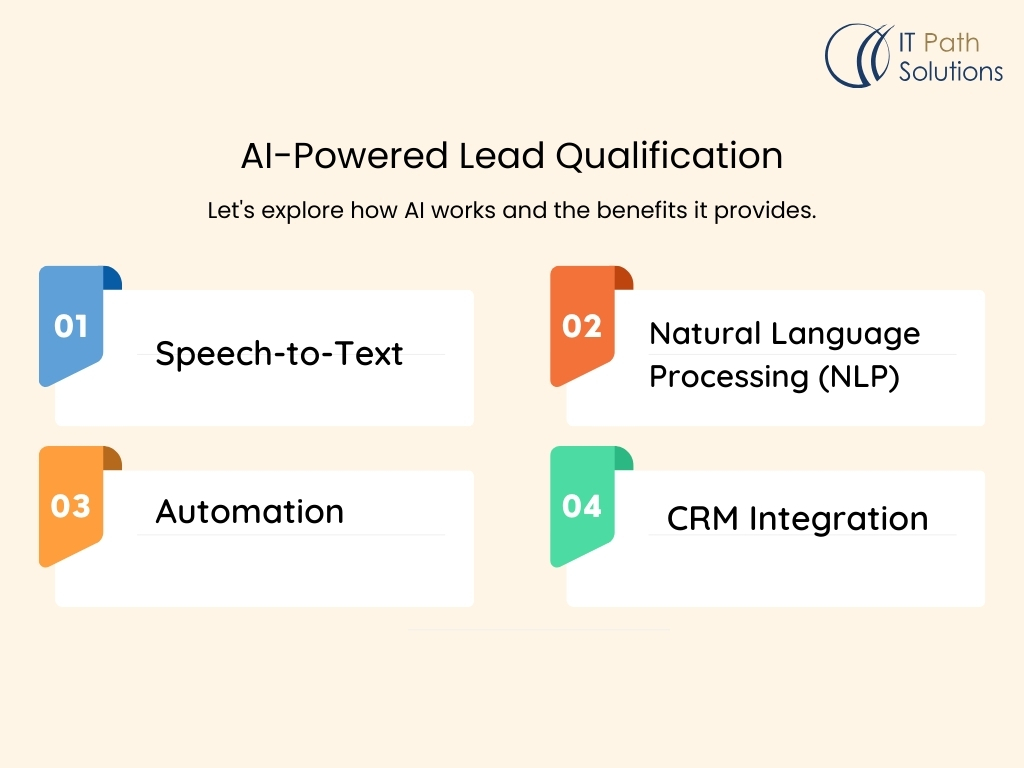
While human reps excel at building relationships, AI-powered systems redefine efficiency in lead qualification. These platforms depend on conversational AI and voice automation to handle thousands of interactions simultaneously without fatigue or overlooked details.
AI delivers consistent, growth-friendly performance by combining advanced technologies like speech-to-text, natural language processing, and CRM integration.
Let’s explore how AI works and the benefits it provides.
How Voice AI Works
- Speech-to-text: Converts spoken words into structured data in real-time.
- Natural Language Processing (NLP): Interprets intent, sentiment, and context from conversations.
- Automation: Handles repetitive tasks like lead scoring, appointment scheduling, and qualification scripts.
- CRM Integration: Automatically syncs data into platforms such as Salesforce, HubSpot, or Zoho for a seamless sales pipeline.
Key Benefits of AI-Powered Qualification
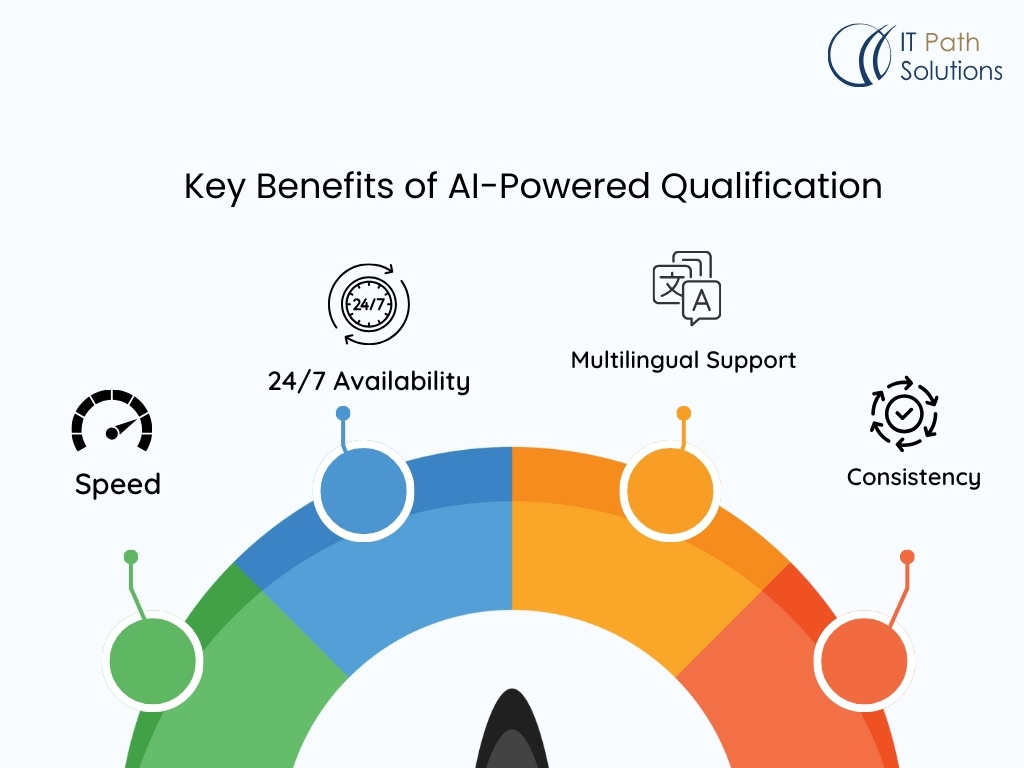
- Speed: Processes inquiries instantly, decreasing lead response time to seconds.
- 24/7 Availability: Round-the-clock qualification without additional staffing.
- Multilingual Support: Engages leads across regions with multiple language capabilities.
- Consistency: Delivers uniform quality across every call, ensuring no detail is lost.
- Scalability: Can qualify thousands of leads simultaneously without performance loss.
➡️Micro-Case: Saas Startup Achieves Record Response Times
A SaaS startup struggling with slow lead responses adopted an AI phone bot integrated with their CRM. Before AI, prospects waited an average of 15 minutes to receive a callback.
After deploying voice AI, the response time dropped to 90 seconds. This improvement alone increased demo bookings by 35 percent within the first quarter.
Core Insight: AI transforms lead qualification from a time-consuming manual task into a scalable, precise, and always-available process that ensures no lead slips through the cracks.
Practical Considerations Before Adopting AI
Adopting AI for lead qualification is not only about replacing human reps with technology. It is about ensuring the system aligns with your business goals, budget, and compliance requirements. It is crucial to carefully examine the following aspects before making the switch.
Cost Models
AI calling solutions typically follow three pricing models:
- Per minute ($0.05-$0.15 per minute): Charges vary based on call duration. It is suitable for small businesses with limited volumes.
- Per conversation ($0.50-$1.50 per conversation): Fixed cost per qualified lead, and often used for predictable budgeting.
- Subscription ($500-$2,000 per month): Monthly or annual plans offering unlimited or high-volume usage, depending on vendor tiers.
Integration with CRMs and Workflows
It is crucial to integrate AI with existing CRMs and sales workflows to enjoy tangible value. Reps will lose the advantage of real-time insights and automated updates without smooth data sync.
Hidden Costs
While AI reduces staffing expenses, you should plan for hidden costs such as:
- Model Training and Tuning: Fine-tuning AI to recognize industry-specific terms.
- Compliance Audits: Meeting regulatory standards such as GDPR and HIPAA.
- Ongoing Optimization: Regular updates to uplift accuracy and minimize errors.
Security and Compliance
AI systems handle sensitive customer data. It makes compliance critical. Businesses must ensure their AI partners provide end-to-end encryption, secure storage, and adherence to privacy regulations.
Ongoing Optimization
AI is not a one-time deployment. It improves like a skilled employee with feedback and updates. Regular monitoring and retraining ensure consistent precision and long-term ROI.
Key Takeaway: The success with AI in lead qualification depends on more than just installing software. Businesses should weigh cost models, integration, compliance, and continuous optimization to maximize returns.
ROI Breakdown: AI vs Human Sales Reps
When businesses evaluate whether to adopt AI or continue with human sales reps, the ultimate deciding factor often comes down to return on investment. Speed, accuracy, availability, and impact on conversion rates influence ROI in lead qualification beyond surface-level costs.
Let us discuss the essential components to consider.
Speed and Response Time
- AI-Powered Systems: Respond to calls in under 2 seconds, drastically decreasing lead drop-off rates.
- Human Reps: The average response time can range from 30 seconds to several minutes, depending on call queues and agent availability.
Accuracy and Consistency
- AI Solutions: Provide precision rates of 85–90 percent in lead scoring when trained with quality data. It ensures consistent qualification across thousands of calls.
- Humans: Perfection varies, often dropping due to fatigue, multitasking, or lack of standardized scoring criteria.
Cost per Lead Qualified
- AI Systems: Average cost per lead qualification can vary between $1 and $3, depending on usage volume.
- Human Reps: The cost can rise to $8 to $15 per lead due to salaries, benefits, training, and downtime.
Availability and Scalability
AI Voice Bots: Operate 24/7 without breaks, enabling global businesses to serve leads in any time zone without added overhead.
Human Teams: Limited to shifts and office hours, often requiring overtime pay or expanded staff to scale.
A Visual Comparison of AI vs Human Sales Reps ROI Breakdown
| Factor | AI-Powered Lead Qualification | Human Sales Reps |
| Speed of Response | Answers in under 2 seconds, no wait time | 30 seconds to several minutes, depending on call queues |
| Accuracy | 85-90% consistency with quality training data | Varies, drops with fatigue or inconsistent scoring criteria |
| Cost per Lead | $1-$3 per lead, depending on call volume | $8-$15 per lead, including salaries, benefits, and downtime |
| Availability | 24/7 operation, scalable across time zones | Limited to shifts and hours, scaling requires more staff |
| Scalability | Instantly handles thousands of simultaneous calls | Restricted by team size and training capacity |
| Conversion Impact | Filters unqualified leads, increasing rep conversions by 20% | Often slower, requiring more time to filter and nurture |
➡️Conversion Impact
A financial services company observed that using AI to pre-qualify leads increased its sales team’s conversion rate by 20 percent. Reps focused only on warm leads, while AI filtered out unqualified prospects, reducing wasted effort.
In a Nutshell: AI delivers faster response times, lower cost per lead, and higher scalability than human reps. While humans bring empathy and nuance, the ROI advantage in high-volume qualification often tilts strongly toward AI-driven workflows.
Cost Analysis: Voice AI vs Human Callers
Businesses need to evaluate the numbers before deciding between AI and human callers. Costs vary significantly depending on scale, whether you are running a small business handling thousands of minutes per month or an enterprise managing tens of thousands.
Below is a breakdown of how Voice AI compares to traditional human reps in real-world scenarios.
| Scenario | Voice AI (SaaS or Custom) | Human Sales Reps |
| Small Business (3,000 minutes/month) | $1,500 – $2,200 monthly (subscription or per-minute pricing) | $9,000 – $12,000 monthly (3-4 reps, salaries + benefits) |
| Enterprise Scaling (6,000+ minutes/month) | $2,800 – $5,000 monthly (subscription tiers or custom build) | $18,000 – $25,000 monthly (6-8 reps, salaries + benefits) |
| Cost Per Lead Qualified | $1-$3 depending on call duration and volume | $8-$15, depending on rep productivity and downtime |
| Additional Costs | Custom integration $10,000-$25,000 one-time (if needed) | Training, turnover, and idle time add 20-30% overhead |
| ROI Potential | Savings of $6,000+ monthly for small businesses, $15,000+ monthly for enterprises | Lower ROI due to higher fixed labor costs and reduced scalability |
➡️Micro-Case Example
A fintech startup handling inbound loan inquiries switched from a 6-person human calling team to a Voice AI solution. Within the first month, they reduced lead qualification costs by $8,500 while cutting average wait times from 4 minutes to under 30 seconds. The shift allowed their sales team to focus on high-value conversations instead of repetitive screening.
The Crux: Voice AI drastically reduces recurring costs while scaling effortlessly, whereas human reps add overhead in the form of salaries, training, and benefits. Enterprises experience nearly six-figure annual savings with AI adoption.
Feature Comparison: AI vs Human Callers
Features often determine whether businesses tilt towards AI, humans, or a combination. While Voice AI systems bring automation, speed, and 24/7 coverage, human representatives excel in empathy and flexibility.
Below is a direct comparison.
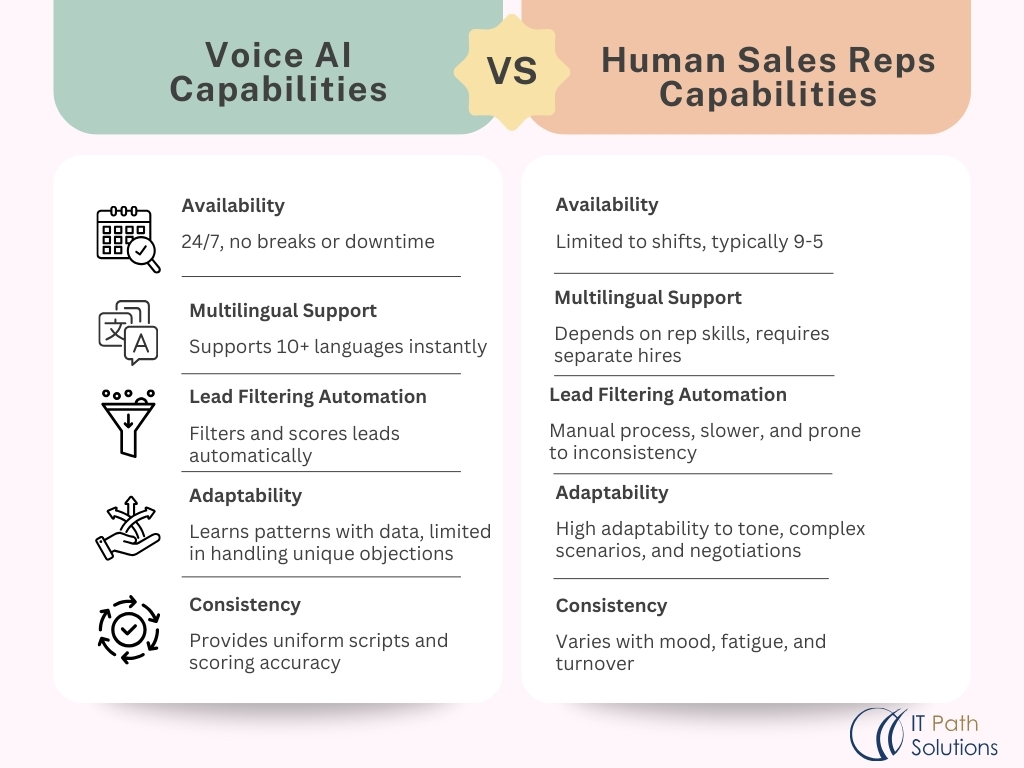
➡️Micro-Case Example
An e-commerce company faced frequent abandoned carts because customer queries were unanswered even after hours.
By implementing Voice AI for initial lead qualification in their process, they resolved product-related questions in real-time, even at midnight. Human agents later stepped in for high-value queries. This hybrid setup enhanced lead conversion by 18 percent within three months.
Must-Know Insight: AI and humans shine in respective areas. AI provides reach, scale, and efficiency, while humans bring emotional depth and adaptability. The ideal strategy often involves blending both for maximum impact.
Performance Comparison: AI vs Humans
Performance goes beyond availability or cost when evaluating ROI. Metrics such as response speed, precision, and conversion handoffs define whether AI, humans, or a blend is the best fit. Hence, we have prepared a tabular breakdown of AI and human performance comparison for better comprehension.
| Performance Metric | Voice AI Performance | Human Sales Rep Performance |
| Response Speed | Replies instantly, reducing response time to seconds | Average 2-5 minutes depending on workload |
| Lead Scoring Accuracy | Consistently applies algorithms for filtering leads | Relies on judgment, prone to fatigue, and bias |
| Scalability Under Pressure | Manages thousands of simultaneous calls | Limited by team size and working hours |
| Conversion Handoff | Seamless transfer to CRM and human closer | Requires manual data entry or handoff steps |
| Error Rate | Minimal if trained well, but it depends on the dataset | Increases with stress, multitasking, or distraction |
| First-Call Contact Success | High, as calls never go unanswered | Lower, especially outside business hours |
➡️Micro-Case Example
A healthcare clinic struggled with productivity as nurses spent 40 percent of their time answering initial patient inquiries.
By introducing Voice AI for pre-qualification, calls were filtered and scheduled automatically. Nurses were then free to focus on actual patient care. Within two months, the clinic reduced call handling time by 35 percent and improved appointment attendance rates.
The Bottom Line: Voice AI wins in speed, consistency, and scalability, while human reps excel at nuanced decision-making and trust-building. The optimal approach is to utilize AI to manage call volumes and human resources to close the deal.
When To Use AI, When To Use Humans
The critical question most businesses face is not whether to use AI or humans, but when to use them. While both options bring unique advantages, the ideal choice depends on the type of leads, deal value, and the complexity of conversations. Hence, we have created a checklist to simplify where each option fits best.
👉AI is best suited for:
- High-volume, repetitive calls such as first-level qualification or basic FAQs.
- Low-value leads where the cost of a human call outweighs the potential return.
- 24/7 availability is required when prospects might contact outside business working hours.
- Multilingual requirements where AI can instantly switch between languages.
- Data capture and CRM updates where consistency is paramount.
👉Humans are best suited for:
- High-ticket deals that require empathy, persuasion, and negotiation.
- Complex objections that demand emotional intelligence and strategic responses.
- Relationship-building with prospects who expect a personal touch.
- Creative problem-solving when conversations move beyond scripts or structured flows.
- Trust-heavy industries such as financial services and healthcare, where reassurance is pivotal.
➡️Balanced Approach
Many organizations adopt a hybrid model. AI handles the heavy lifting by filtering, qualifying, and scheduling, while humans step in for closing or nurturing. It ensures cost efficiency without sacrificing emotional intelligence where it matters most.
What This Means For You: Businesses should let AI handle scale and speed while specialists bring depth and trust. The harmony lies in matching the appropriate tool to the right stage of the sales cycle.
Hybrid Model: Combining AI + Human Reps
For most businesses, the sweet spot is not merely about picking between AI and humans, but combining the two. A hybrid model enables companies to leverage AI’s efficiency and humans’ emotional intelligence without compromising either side.
Here is how a practical workflow looks:
Step 1: AI Handles the Initial Contact
- AI phone bots answer every call instantly.
- They filter common inquiries, capture key details, and qualify leads using predefined criteria.
Step 2: AI Scores and Routes Leads
- Prioritizing prospects that match business requirements.
- The AI updates the CRM automatically and routes high-value leads to human reps.
Step 3: Human Reps Close and Nurture
- Sales teams engage with pre-qualified leads who have already contacted them.
- Humans focus on handling objections, building trust, and sealing high-ticket deals.
➡️Micro-Case Example
A B2B SaaS company implemented this hybrid workflow. AI handled 70 percent of initial calls, cutting response time from 12 minutes to 90 seconds. Human reps then concentrated on complex prospects, improving conversion rates by 25 percent in just three months.
👉Why This Matters
The hybrid model reduces wasted time on unqualified leads, ensures prospects receive instant responses, and lets sales reps focus on what they do best. It is the most cost-efficient and performance-driven way to run lead qualification today.
Essential Insight: The future of sales calls is not about AI replacing humans, but AI qualifying at scale and humans closing with empathy. Together, they create the highest ROI.
Industry Use Cases Of Automated Lead Qualification
Automated lead qualification is not limited to one sector. Every industry vertical that depends on phone calls to screen prospects, confirm interest, or collect details can benefit from AI.
Let us explore how it performs across different verticals.
Real Estate: Savvier Buyer Screening
Imagine an agency handling hundreds of daily property inquiries. With an AI phone bot, buyers are instantly asked about their budget, location, and financing readiness.
Only serious prospects are routed to agents, cutting wasted time and increasing property viewings by up to 40 percent.
SaaS: Filtering Demo Requests
A SaaS startup faced a stream of demo sign-ups who weren’t vetted. AI handled inbound calls, asked qualifying questions about team size, budget, and use case, and sent only conversion-ready leads to human reps. It reduced manual filtering and boosted sales efficiency by 30 percent.
You can refer to our blog:- What is SaaS (Software as a Service) and Why It Matters for Businesses
Healthcare: Appointment Qualification
Consider a clinic receiving constant calls for appointments. An AI assistant verifies insurance, urgency, and patient information before booking an appointment. It cuts administrative workload in half while ensuring critical patients are prioritized for speedier care.
You can refer to our blog – How To Transform Patient Care with Innovative Healthcare Mobility Solutions
Fintech: Fraud Alerts and Loan Pre-Checks
A financial services firm used AI to handle loan inquiries. The system verified eligibility based on credit score and employment status during the first call. Fraudulent or low-fit applicants were filtered out early, reducing compliance risks and saving thousands in processing costs.
E-Commerce: Handling High Call Volumes
An online marketplace faced 10,000 product-related calls daily. AI bots answered instantly, qualified customer intent, and redirected only high-value leads or escalations to human reps. This slashed abandonment rates and gave the team space to focus on big-ticket orders.
You can check out our blog – B2B eCommerce Development Strategies To Drive Sales Growth In 2025
Quick Recap: From property deals to patient care, AI qualification ensures businesses focus energy on prospects that matter most. It results in efficiency gains that humans alone cannot achieve at scale.
Challenges And Pitfalls Of Human Callers, And How AI Lead Qualification Resolves Them
Relying solely on human sales reps for lead qualification can create significant barriers for businesses, especially in high-volume industries. Below are the most common pitfalls of human-driven calling, and how AI-powered lead qualification addresses them.
High Operational Costs
- Human Pitfall: Salaries, training, turnover, and overhead quickly add up to overall expenditures, with costs often exceeding thousands each month. Idle time during sluggish periods still drains resources.
- AI Solution: Voice AI operates on a usage-based or subscription model, reducing fixed overhead. Businesses can scale up or down without worrying about wasted payroll.
Fatigue and Inconsistency
- Human Pitfall: Reps experience fatigue, boredom, and distraction, leading to ignored details and inconsistent lead scoring.
- AI Solution: AI systems never get tired or lose focus. Every call is handled with the same precision, ensuring reliable qualification.
Limited Scalability
- Human Pitfall: A rep can handle only one call at a time. Scaling requires constant hiring, which hinders growth and inflates expenses.
- AI Solution: AI can handle thousands of calls simultaneously. It makes high-volume lead screening and sales funnel expansion seamless.
Data Capture and Accuracy Gaps
- Human Pitfall: Manual data entry is prone to errors and often incomplete, which impacts CRM reliability.
- AI Solution: AI integrates directly with CRMs, logging every interaction automatically. It ensures complete, structured data that enriches lead scoring accuracy.
Time Constraints and Availability
- Human Pitfall: Human callers typically work 9-to-5, leaving leads unanswered during evenings, weekends, or global time zones.
- AI Solution: AI voice assistants offer 24/7 coverage, capturing every opportunity and providing immediate qualification regardless of when leads make contact.
Handling Multilingual or Complex Demands
- Human Pitfall: Recruiting multilingual reps is costly, and availability is limited. Complex queries often require rerouting.
- AI Solution: AI systems support multiple languages instantly, offering smooth communication for global audiences and escalating complex conversations to humans only when needed.
Smart Summary: Human reps are valuable for closing deals, but their limitations in cost, consistency, and scalability make them inefficient for first-stage lead qualification. AI eliminates these bottlenecks, delivering businesses higher ROI, accurate data, and round-the-clock coverage.
Future Of Automated Lead Qualification
With the gaps of human-led qualification already clear, the question is not whether AI can outperform humans, but how far AI will go in reshaping sales calls. To build on what you have seen so far, let us now explore the innovations that are already shaping the next wave of AI adoption.
Generative AI for Objection Handling
AI is moving beyond scripts, learning to handle delicate objections with adaptive responses that mimic human empathy while staying compliant and accurate.
Voice Cloning for Brand Identity
Businesses are experimenting with AI that replicates a company’s voice style, ensuring that every interaction sounds consistent and recognizable.
Predictive AI for Intent Detection
Instead of simply scoring leads after the fact, predictive models will anticipate intent during conversations. They will also guide reps on the subsequent best action in real-time.
Emotion Detection for Empathy
AI systems are being trained to detect tone, pauses, and sentiment. It enables escalation to human reps when emotional intelligence is required, creating a seamless hybrid experience.
Always-on Multilingual Communication
AI will expand its ability to instantly translate and converse across languages, making lead qualification borderless and accessible for global markets.
Final Thought: The future of lead qualification is not just about replacing manual tasks; it is about creating intelligent, adaptive, and empathetic systems that amplify sales outcomes. Companies that invest early will set the pace for an AI-first sales era.
Conclusion
The debate of AI vs human sales representatives is not about one replacing the other; it is about creating a system where efficiency, consistency, and personalization coexist.
Throughout the guide, we’ve explored how automated lead qualification by phone reduces costs, accelerates response times, and improves lead accuracy in ways human-only teams cannot sustain.
Yet, human reps still hold the edge in trust-building, handling complex objections, and closing high-value deals. That is why the most effective strategy lies in collaboration. AI does the heavy lifting of high-volume qualification while humans step in where empathy, creativity, and persuasion are irreplaceable.
➡️The takeaway is clear for businesses. Embracing AI-powered lead qualification is a practical step toward scaling operations, optimizing resources, and securing measurable ROI today.
At IT Path Solutions, we specialize in building custom AI lead qualification software tailored to your sales workflows.
If you ever need voice AI bots integrated with your CRM, real-time lead scoring models, or hybrid AI-human collaboration systems, we are just a contact away. Our team has the expertise to deliver solutions that drive fruitful results.
The future of lead qualification is intelligent, adaptive, and ROI-driven. And the actual question is not whether AI can help your business, but how soon you are ready to let it accelerate your growth.
FAQ
Is AI Accurate Enough To Replace Humans In Lead Qualification?
AI is highly accurate at filtering, scoring, and qualifying leads when trained with quality data. It excels in speed, consistency, and scale. However, humans are still superior at handling complex objections and emotional intelligence.
The best results come from hybrid models where AI qualifies the prospect and humans seal the deal.
How Much Does It Cost To Develop AI Lead Qualification Software?
Development costs vary based on features, integrations, and scale. A custom AI lead qualification system can range from $40,000 to $120,000 for a complete build, while simpler solutions using APIs may cost less. Ongoing expenses include training data, maintenance, and compliance updates.
Which Programming Languages Are Best For AI Lead Qualification Development?
Python is the most popular language due to its AI and machine learning libraries (TensorFlow and PyTorch). JavaScript frameworks work well for frontend and CRM integrations, while Node.js and Java support backend scalability.
Choosing the ideal stack depends on your workflow and system integrations needs.
How To Integrate AI Lead Qualification With Existing CRM Systems?
Integration is typically achieved through APIs and webhooks. Popular CRMs such as Salesforce, HubSpot, and Zoho support AI add-ons or direct API connections.
It allows AI phone bots to feed vetted lead data directly into pipelines. It ensures smooth workflows, real-time updates, and measurable ROI for sales teams.
Can AI Handle Objections And Complex Sales Conversations?
AI is improving in handling simple objections with NLP and pre-trained responses. However, complex negotiations or emotional conversations still require human reps.
The best approach is to use AI for qualification and hand off complex conversations to human agents for a seamless customer experience.
What Industries Benefit Most From AI Lead Qualification?
Industries with high call volumes and repetitive inquiries benefit the most. It includes real estate, healthcare, financial services, SaaS, insurance, and e-commerce.
AI reduces workload, accelerates qualification, and ensures no lead is missed. It makes it highly valuable for businesses that depend on timely responses.
How Secure Is AI In Handling Customer Data?
AI lead qualification systems can be made secure with encryption, role-based access, and compliance frameworks such as GDPR and HIPAA.
Ensuring strong data governance, anonymization where possible, and performing regular audits safeguards customer conversations and cultivates trust in AI-driven sales processes.
How To Measure The ROI Of AI Lead Qualification Software?
ROI is measured by tracking key metrics like cost per lead, conversion rates, lead response time, call volume handled, and reduced labor expenses. Businesses often experience that AI pays for itself by lowering costs, qualifying more leads, and improving overall sales pipeline efficiency.
Keyur Patel
Co-Founder
Keyur Patel is the director at IT Path Solutions, where he helps businesses develop scalable applications. With his extensive experience and visionary approach, he leads the team to create futuristic solutions. Keyur Patel has exceptional leadership skills and technical expertise in Node.js, .Net, React.js, AI/ML, and PHP frameworks. His dedication to driving digital transformation makes him an invaluable asset to the company.
Get in Touch
Search
Blog Categories
